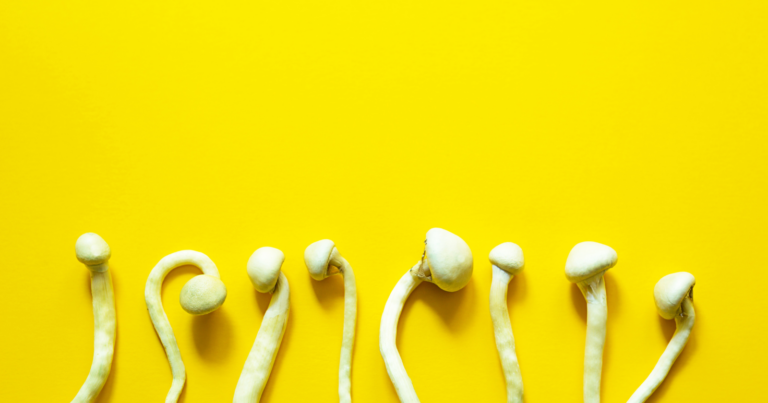Imagine finding relief for gut troubles not in a pharmacy, but in your garden or kitchen pantry.
That’s exactly what a group of Australian adults discovered when they tried a unique blend of herbs known to soothe the gut.
In a groundbreaking study, Australian adults suffering from a range of digestive disorders experienced significant relief after incorporating a unique herbal formula into their regimen.
And this is just one of many studies that prove the healing power of herbs for maintaining a healthy digestive system.
Today, I’m going to present 8 powerful herbs that are remarkably beneficial for gut healing. But before, let’s take a look at the scientific findings on using herbs for your gut health.
What does science say about herbal medicine for gut health?
The prevalence of gastrointestinal (GI) issues in Western populations is staggering, affecting half of these communities with symptoms ranging from reflux to irritable bowel syndrome (IBS).
In response, the scientists introduced the Nutrition Care Gut Relief Formula, which contains a blend of curcumin, Aloe vera, slippery elm, and other gut-friendly ingredients.
Believe it or not, this gut formula has been shown to alleviate symptoms by 60–80%. And this, in my opinion, is a potential paradigm shift in the treatment of gastrointestinal issues.
To be more precise, the Nutrition Care Gut Relief Formula was rigorously tested in a 16-week study, showcasing its efficacy in not just reducing GI symptoms but also enhancing the overall quality of life for individuals with digestive disorders.
This formula stands out due to its unique blend of herbs and nutrients, all of which are known for their beneficial effects on the GI system.
Moreover, the study highlighted the formula’s ability to significantly improve physical functioning, energy levels, mood, and sleep for participants.
A notable 90% of participants with hard stool and 66% with soft stool saw a recovery from intestinal permeability to normal levels.
This highlights the potential of the formula not just as a symptomatic relief but as a means to address underlying gut health issues.
Let’s examine their benefits and explore how to incorporate them into your daily routine for optimal gut health.
1) Peppermint for soothing gut inflammation
Peppermint is a potent herb that I find fascinating for its dual role in promoting gut health and overall wellness.
For starters, peppermint has been shown to soothe inflammation in the gut.
The menthol present in peppermint helps relax the muscles of the gastrointestinal tract, which can alleviate symptoms of abdominal pain and bloating associated with conditions like irritable bowel syndrome.
Want to know what makes peppermint stand out for me?
It’s the herb’s ability to act as an analgesic and anti-spasmodic agent, that makes it particularly useful for alleviating discomfort and spasms in the gut.
This can be especially beneficial for people with chronic digestive disorders.
In addition, peppermint is also known for its antimicrobial properties. Therefore, it can help maintain a healthy balance of gut flora, which is crucial for optimal digestion and nutrient absorption.
2) Chamomile for reducing gut irritation
Chamomile, often associated with a calming cup of tea, is another herb that plays a significant role in gut health.
This dainty flower is packed with substances known as flavonoids, which have distinct anti-inflammatory properties. When it comes to gut health, these flavonoids can work wonders by reducing irritation and inflammation in the digestive tract.
What’s even more interesting?
Chamomile has been found to have antispasmodic properties. This means it can help soothe muscle spasms in the gastrointestinal tract, providing relief from conditions like stomach cramps and irritable bowel syndrome.
Not just that, chamomile also promotes relaxation, which indirectly benefits gut health. Stress is a known trigger for digestive issues – by helping reduce stress levels, chamomile aids in maintaining a healthy gut.
Adding chamomile to your diet could therefore be a holistic approach to enhancing both your mental well-being and gut health.
3) Fennel seeds for improving digestion
Continuing with our exploration of gut-healing herbs, let’s turn to a slightly underrated one – fennel seeds.
Now, you might be wondering, “Fennel seeds? Really?”
Yes, really.
Fennel seeds have a rich history in traditional medicine for their digestive benefits.
Loaded with fiber, they help the digestive system’s smooth functioning by facilitating food movement through the digestive tract.
But here’s the surprising part:
Fennel seeds contain a compound known as anethole.
This compound has anti-inflammatory properties and has been found to help relax the muscles in the stomach, reducing bloating and discomfort.
Moreover, fennel seeds have been found to stimulate bile production, a key aspect of fat digestion.
Considering their numerous digestive benefits, don’t overlook these tiny powerhouses when planning your gut health regimen.
4) Ginger for Gut Mobility
Ever thought about the journey your food takes after you eat?
It’s a long and complex one that relies heavily on gut mobility. This is where our next herb, ginger, comes into play.
Ginger is well-known for its effect on the digestive system. It helps speed up gastric emptying, which can benefit people who experience discomfort and bloating after eating.
In simple terms, it helps move food more swiftly from your stomach to your small intestine.
But that’s not all.
Ginger is also loaded with gingerols and shogaols – compounds that have anti-inflammatory and antioxidant effects. They aid in protecting your gut from inflammation and oxidative stress, thus promoting a healthier gut environment.
So, if you are seeking to enhance your digestive health and keep your gut moving smoothly, adding ginger to your diet could be a smart move.

5) Turmeric for gut inflammation
Taking a slightly different turn, let’s focus on an herb celebrated for its potent anti-inflammatory properties – turmeric.
Turmeric contains a powerful compound called curcumin. This compound is a natural anti-inflammatory agent that has been extensively studied for its health benefits.
Its relevance to gut health?
Well, inflammation is often at the root of many gut disorders, from inflammatory bowel disease to gastritis. By reducing inflammation, curcumin can help manage these conditions and promote a healthier gut.
To maximize the benefits of turmeric for gut health, consider:
- Adding turmeric to your meals for a flavorful and healthy twist.
- Taking turmeric supplements to ensure you get a substantial amount of curcumin.
- Combining turmeric with black pepper to enhance curcumin absorption.
Harnessing the power of turmeric can therefore be a significant step towards achieving better gut health.
6) Slippery elm for gut protection
Slippery elm may not be as well-known as some of the other herbs we’ve discussed. But trust me, its benefits for gut health are not to be underestimated.
Here’s why I find it intriguing:
Slippery elm contains a type of fiber known as mucilage. When consumed, this fiber forms a gel-like substance that coats and soothes the lining of the digestive tract.
This can provide much-needed relief from conditions like gastritis and ulcerative colitis.
What’s more, this protective layer can also serve as a barrier against acidity, further preserving the integrity of your gut lining.
We often focus on reducing inflammation or enhancing digestion, but protecting the gut lining is equally important.
It’s our first line of defense against harmful substances in our food.
7) Dandelion for detoxification
Most of the time, we think of dandelion with a pesky weed that takes over our gardens.
Well, I know this might sound surprising, but this common garden weed is actually a potent herb with significant benefits for your digestive system.
Dandelion has long been used in traditional medicine for its detoxifying properties. It’s known to stimulate the liver and promote the production of bile, which plays a vital role in digestion.
Let me discuss some of its benefits:
Dandelion is rich in fiber, which aids in healthy digestion by adding bulk to the stool, promoting regular bowel movements.
And regular bowel movements are essential for detoxification, right? Because they help remove waste and toxins from our bodies.
Now, imagine suffering from occasional constipation.
A little dandelion in your diet could potentially ease your discomfort by promoting regular bowel movement.
8) Aloe Vera for gut healing and repair
Last but certainly not least on our list is Aloe vera – a plant well-known for its skin-soothing properties, but did you know it’s also a powerhouse for gut health?
Aloe vera contains a complex carbohydrate known as acemannan, which helps in the healing and repair of the gut lining.
It’s particularly helpful for those with leaky gut syndrome, a condition where the gut wall becomes permeable, allowing bacteria and toxins to leak into the bloodstream.
Similar to most other herbs we discussed, aloe vera has natural anti-inflammatory and laxative properties. This helps soothe inflammation in the gut and promote regular bowel movements.
This means that incorporating Aloe Vera into your diet can support the overall healing and repair process of your digestive system.
The rising concern of GI issues in Western society
The prevalence of gastrointestinal (GI) issues in Western populations is staggering.
In fact, health issues affect half of these communities, with symptoms ranging from reflux to irritable bowel syndrome (IBS).
Specifically, according to the National Institute of Diabetes and Digestive and Kidney Diseases (NIDDK), up to 60–70 million people suffer from all types of digestive diseases.
Some of these conditions are chronic and can significantly impair daily functioning and overall quality of life.
For instance, gastroesophageal reflux disease (GERD) affects about 20% of the U.S. population, causing symptoms like heartburn and acid reflux that can severely impact an individual’s comfort and well-being.
Additionally, chronic conditions like Crohn’s disease and ulcerative colitis, forms of Inflammatory Bowel Disease (IBD), affect millions, leading to debilitating symptoms and often requiring lifelong management.
Despite the widespread nature of these issues, conventional treatments often fall short.
All they offer is temporary relief or significant side effects.
That’s why I believe it’s important to start thinking about alternative remedies, including dietary changes and herbal supplements for more holistic healing.
How can you incorporate these herbs into your daily routine?
Incorporating these herbs into your daily routine for gut healing doesn’t have to be a daunting task.
It can be as simple as adding them to your meals, brewing them into teas, or taking them as supplements.
Let me finish the article with some tips to help you get started with herbal healing:
- Peppermint can be used fresh in salads or brewed into a soothing tea.
- Chamomile flowers make a calming tea that’s perfect for the evening.
- Fennel seeds can be chewed after meals or used as a spice in cooking.
- Ginger can be grated into stir-frys, juiced, or made into tea.
- Turmeric can be added to curries, smoothies, or taken as a supplement.
- Slippery elm is often taken as a supplement or tea.
- Dandelion leaves can be used in salads, while the roots make a great tea.
- Aloe vera juice is readily available and can be drunk on its own or added to smoothies.
The world of healing herbs is vast and fascinating.
By exploring it, you’re not only taking steps towards better gut health but also embarking on an empowering journey of self-discovery and holistic well-being.
Take your time, listen to your body’s responses, and remember that every small step counts.











